AT WHAT POINT ARE THE HOMOPHOBIC HURTS OF FAMILY ENOUGH?
“I will love you till the day that I die,” Gabrielle Union’s Inez says to her son, Ellis (played by Jeremy Pope), the 25-year-old who’s just graduated from Marine boot camp.
He starts to smile at what appears to be his mother’s first show of maternal affection for the first time in nine years.
That smile freezes out at Inez’s next words: “But I can’t love what you are.”
This is a scene from the 2022 movie, The Inspection, a starring vehicle for Jeremy Pope. Based on the real-life experiences of the movie’s writer and director, Elegance Bratton, the movie tells the story of a young, gay Black man, Ellis French, who has been homeless for years, since his homophobic mother threw him out when he was a teenager. Ellis has very few options for his future, but he is burdened with a need to prove himself to his estranged mother and is determined to triumph in a system that is set up to ostracize him. So he decides to enlist.
To do that, he needs his birth certificate, which he goes to his mother’s house to get. The movie wastes no time in setting up the dynamics of a strained relationship between mother and son, as Inez tells Ellis to consider his birth certificate “null and void” if he continues on his present course; it is clear she is not talking about him getting a job and fixing his life. The truth here is that Inez despises her son’s sexual orientation. She treats it like a disease he is infected with, that could contaminate her personal space as is evidenced in the way she is reluctant to let him into the house and how she spreads out newspapers on her couch before permitting him to sit down.
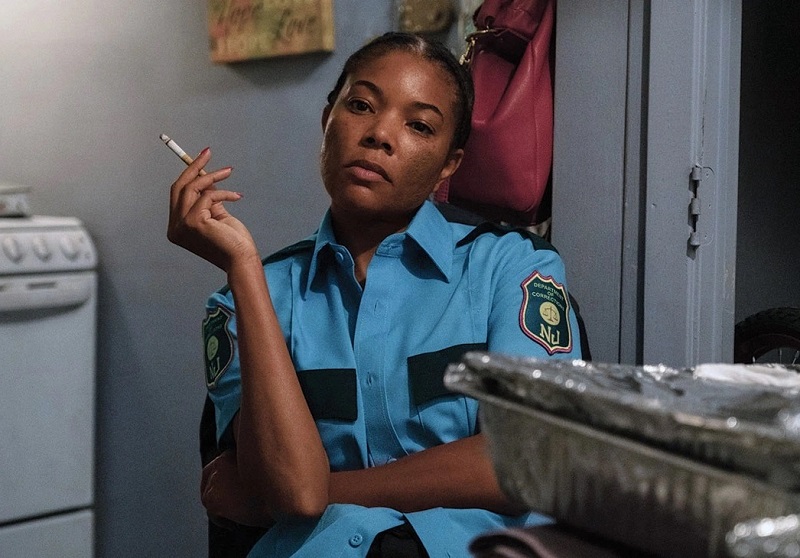
Inez French
“This little piece of paper… It’s all I have left of the dream I held for you,” she says as she looks coldly, distastefully into her son’s eyes. “If you don’t come back the son I gave birth to, consider this certificate void.”
It is cruel, the kind of rebuke that would break any queer person down, coming from a beloved family member.
But what does Ellis do in response?
He leans forward and kisses his mother on the cheek: a profession of his love for her in spite of her disdain for him.
Then he takes his mother’s reproval with him to boot camp, in a time period when the American military, whilst operating under the policy of “don’t ask, don’t tell”, was still overladen with centuries of institutionalized homophobia. Among all the questions that are hurled at the new recruits by the instructing officers – “Have you ever been convicted of a felony?”, “Have you recently smoked marijuana?” and “Are you a communist?” – is this: “Are you a homosexual?”
You can tell from the startled side-eye that Ellis gives the officer barking those questions at the recruit next to him that he is just starting to realize the burden of the closet he has put himself into with this training. He may have lived a defiant life that got him thrown out by his mother – but here, with this being the only opportunity he has to make something out of his life, he yells, “No, sir!” in response to the questions thrown at him.
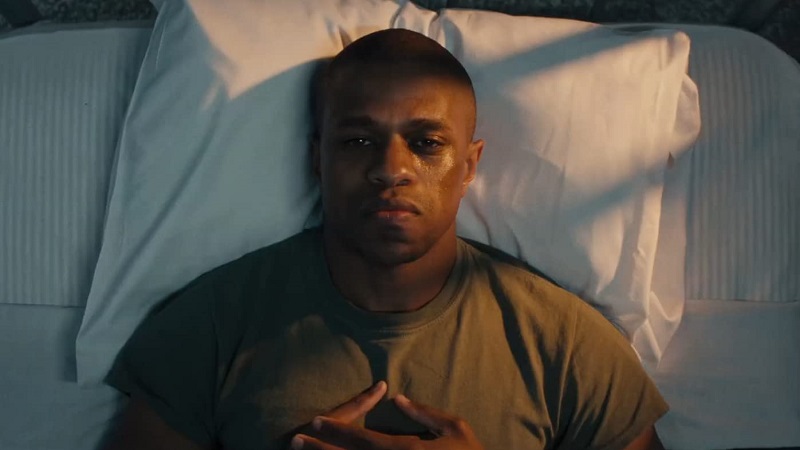
Ellis French
Not that his cover lasts long. He is soon outed and suffers for it. With the deep-seated prejudice and grueling rigour of training, he struggles but stays determined to make it through. The head drill instructor, Gunnery Sergeant Leland Laws (played by Bokeem Woodbine) zeroes in on him. “I will break you, I promise you,” are his first words to the recruits, and he inflicts this emotional and physical abuse on Ellis, escalating to the point where even Laws’ fellow instructors warn him that he’s gone over the edge.
And perhaps this is what Inez is counting on to fix her son. Perhaps she is aware of the military’s brutal training process and hopes that all her homosexual child needs is some heavy-handed, masculine energy to set him straight (pun intended). And God forbid she interferes with that process. She doesn’t call Ellis or send him any letters, and once, when he is finally able to get through to her on the phone and wants to know how she is doing, she tells him, “Boy, you know not to call me at my job with this damn nonsense.”
There will be no comfort to be had here, no maternal solace from the inclemency of boot camp.
“I love you,” he tells his mother.
And she hangs up without saying it back to him.
However, in a rare show of support, Inez attends Ellis’ graduation. She even beams at him, touches his cheeks, proudly acknowledging that he has done it.
He is now a man, Inez must think.
No more of that gay nonsense.
She even offers to have him back home, to her house, to her “good home cooking”. She calls him “Baby”. She’s a proud mama. She cannot wait to have “all them young, pretty little things, all them girls” flocking around her “marine son”.
Imagine her shocked outrage when Ellis puts a stop to her nonsense by stating categorically, “Boot camp didn’t make me straight.”
And this is when Inez’s true character is revealed: in this moment when she believes she has the power to break or protect her son, when she thinks that outing him to a room-full of Marines would result in, at least, physical harm to Ellis and, at worst, a swift discharge from the uniform – she chooses to do exactly THAT.
“This boy is gayer than two left shoes and everybody can see it,” she announces to the room at large and to Sergeant Laws in particular. “Y’all had no business letting him in here.”
There is an astonishing spite to her actions, as though nothing will bring her the greatest joy than for this “boy” who is clearly still NOT “the son she gave birth to” to be made to no longer exist. Or at the very least, be made to suffer.
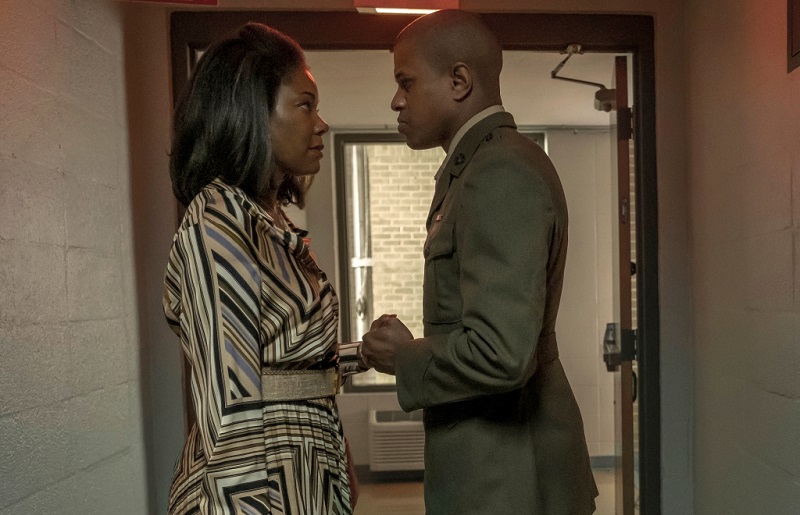
Mother and Son
As I watched this film, I couldn’t help but call to mind a couple of friends of mine who have homophobic mothers. These mothers express their prejudice against their sons in different ways. There is the one who has shown that, after these many years since learning of her son’s homosexuality, she will never accept it. But she is kind in her bias, maternal still, is invested in her son’s success in life, would rather treat his sexuality as an inconvenience she is praying to God will one day soon go away.
The other mother is the real-life personification of Inez French: vindictive, condemnatory, never misses an opportunity to relate whatever misfortune her son has suffered with his sexual orientation, always ready to throw him to the mercy of her pastors, disregarding the potential harm this action might expose her son to. She has moments when her maternity emerges, but those moments are far outweighed by her frequent bursts of spite.
And every time I speak with my friend about his mother’s cruelty toward him, I am frequently exasperated by the love and patience it appears he still reserves for her.
And in that exasperation, I often wonder: When is it enough?!
There are stories told on the Nigerian blogosphere of the particularly unloving attitudes of parents towards their children:
the father who beat his daughter to within an inch of her life when he learned she was a lesbian;
the parents who told the kito criminals that kidnapped their son to keep him and do with him whatever they please after they called with their ransom demand;
people fuming in the comments section of media outlets reporting on Bobrisky that God should forbid them having an offspring who will one day want to become a “shim”;
Nigerians frequently swearing on social media on all the horrors they will visit on their children, should they find out that they’re gay.
We are constantly inundated with the realities of a people whose love for their children is conditional on them not being gay or trans.
And yet, you get reactions from the queer community that ranges from excusing the excesses of their family members to enduring the abuse from them. Why, even here on Kito Diaries, we have had engagements where the preservation of family is preached and the idea that one might value their sense of worth and freedom over their family is received without any warmth. You’d be on queer webinars and encounter opinions about how “our parents didn’t bargain for us to be gay. We should give them some latitude as they struggle to accept us.”
And while this sentiment may be noble, certainly the right thing to do when you observe that genuine struggle with your family members that could lead to them someday accepting you, that struggle that in no way blemishes their love for you, what happens in the case where they suffer you with abuse – physical, emotional or psychological? What happens when there is a real vindictiveness driving their actions to break you down? Are we to continue enduring because they are family or –
Will it ever get to a time when enough is enough?
Written by Pink Panther

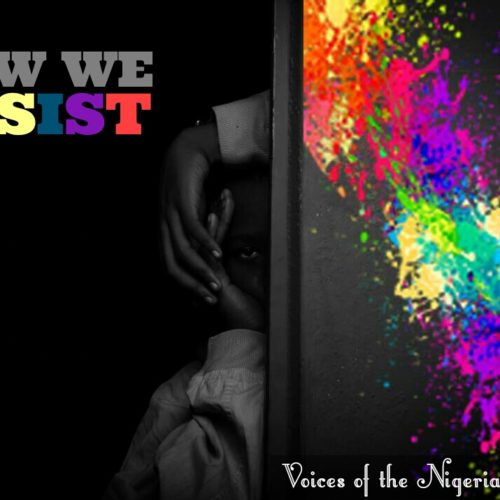
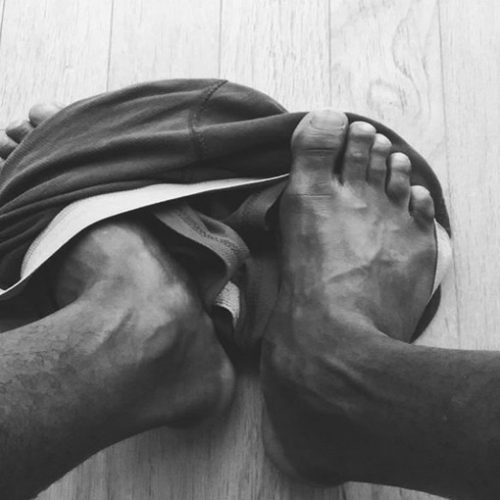






3 Comments
Gaia
April 12, 14:01For me, I make sure to draw a very thick line between my family and my sexuality. I don’t give them the opportunity to talk about it unless I’m mentally ready for it.
He Is Him
April 13, 21:40I have given up on family. Everyone is cut off totally now because it got to a point of emotional blackmail, lies and curses – borderline spiritual fighting. Do I love my family? Yes. But I’ll not allow them to ruin my life and mental health. I choose me before anything else. With the level of manipulation currently at play, I’ll just stay in my lane until change happens. I don’t need them to survive.
Loki
April 21, 14:46Eons of conditionning hasade us give too much respect and accolade to arents even when it is obvious they are in fault. I had similar arguments with my ex. I do know that should knowledge of my sexuality be aired, my family except my blood brothers (they sort of look up to me a lot) would throw me out and at such I moved to a different state, to avoid them and make them get used to not having me around, sort of preparing for that d-day(which might still not come though). My ex would go on a rant about how family is family no matter what and how it’s not really their fault but we should cut them some slack, bla bla bla. It was really annoying.
Inasmuch as we love our families, there has to be a line where we no longer accept it. Craving rhe love of others at our own expense, craving their acceptance, craving their happiness at my own expense is one thing we should not always accept but then we no go gree. We go just dey waka dey go, going through various troubles, slaving away all for people who wouldn’t spit on us if we were on fire.